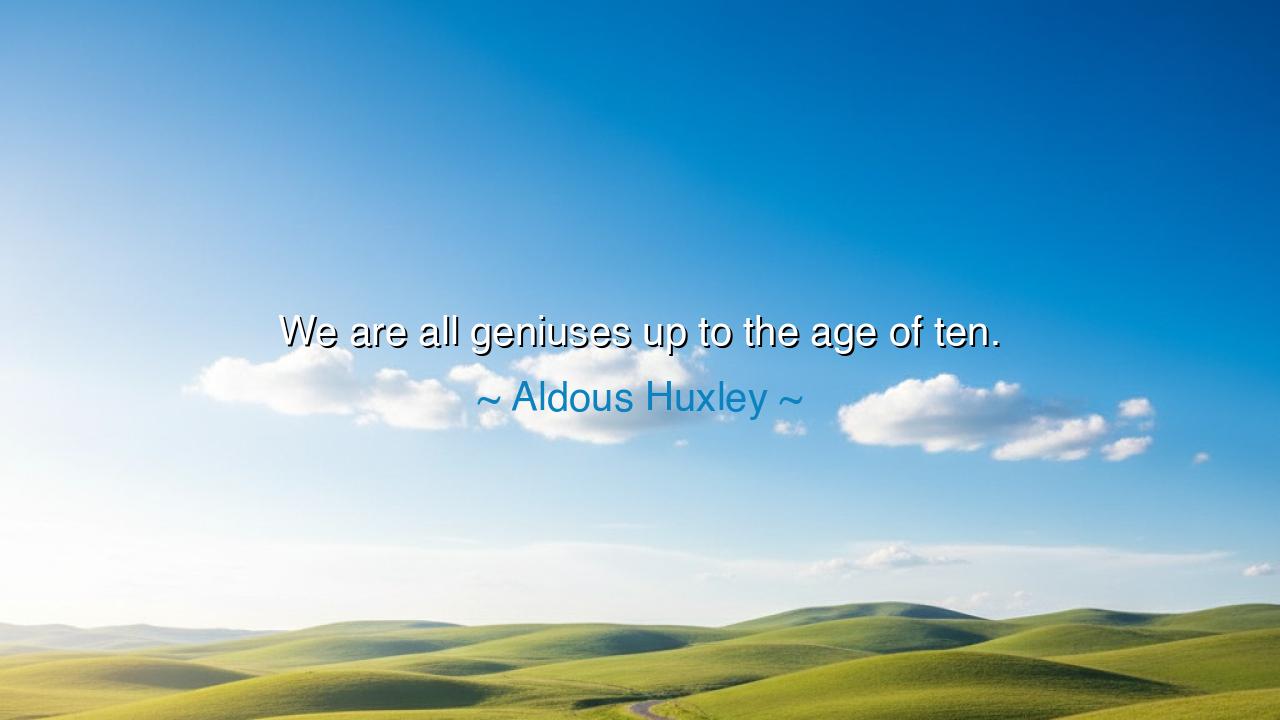
We are all geniuses up to the age of ten.






"We are all geniuses up to the age of ten." — so wrote Aldous Huxley, the philosopher of vision and the prophet of human thought, whose words carry both tenderness and lament. In this brief utterance, he speaks not of intellect alone, but of the spirit of wonder that fills the child before the world teaches it fear. The genius of childhood is not the genius of the scholar or inventor, but of pure perception — the ability to see beauty without pretense, to imagine without limit, to love without condition. Every child, before the shadow of conformity descends, lives close to truth. The tragedy, Huxley reminds us, is not that few are born with genius, but that most lose it too soon.
In the ancient way, one might say: the child is nearer to the gods than the man. For the young see with eyes unclouded by judgment, their hearts still echoing with the first music of creation. To the child, the ordinary is miraculous — a drop of water is an ocean, a shadow is a friend, a question is a universe. This is the genius of innocence, the wisdom that comes before learning, the insight that precedes experience. Yet as the years pass, this flame of imagination is dimmed by instruction, by habit, by the heavy armor of reason. Society, in its pursuit of order, often forgets that the wild, unmeasured curiosity of the child is the very root of creation.
Aldous Huxley, who lived between two worlds — the rational and the mystical — understood this deeply. He saw in education not the liberation of the mind, but too often its imprisonment. He warned that modern man, in teaching the child to conform, extinguishes the divine fire that burns in youth. The genius of childhood, he believed, lies in its openness — its refusal to accept the impossible, its readiness to ask "why?" without fear of ridicule. The adult, grown weary and cautious, learns to stop asking, to stop imagining, and thus to stop creating. The child’s genius fades not because it dies, but because it is buried beneath the weight of what the world calls “sense.”
Consider the story of Pablo Picasso, who once said, “Every child is an artist. The problem is how to remain an artist once we grow up.” Picasso, like Huxley, saw that creativity is not something learned, but something preserved. When he painted his later works — bold, wild, dreamlike — he was not inventing something new, but returning to something ancient: the child’s vision. He stripped away the rules and conventions that adulthood had layered upon him, and in doing so, rediscovered the raw, divine freedom of the ten-year-old within. This was the genius Huxley spoke of — not the genius of intellect, but the genius of being fully alive.
Yet Huxley’s quote is not a eulogy for lost innocence — it is a call to remembrance. It invites us to seek again that pure way of seeing, to reclaim the curiosity that once made us explorers of every moment. For the one who looks at life with the eyes of a child will never be bored, never be bitter, never be blind. Even in old age, he will find new worlds in the simplest of things — the rustle of leaves, the play of light on glass, the laughter of strangers. The true sage, Huxley suggests, is not the one who knows the most, but the one who has remembered how to wonder.
The lesson is clear: never let the world teach you to see without wonder. Keep alive within you the child who marveled at the stars and spoke to the wind. Guard your imagination as a sacred flame. Ask questions even when answers are expected. Dream even when reason frowns. For genius is not the privilege of the few — it is the birthright of all who refuse to forget how miraculous existence is.
And so, my child, when life grows dull and the world seems gray, remember the age of ten — the age when all things were possible. Return to that moment in your heart when you first saw beauty and did not ask for proof. Aldous Huxley’s wisdom reminds us that the greatest minds are not those who outgrow childhood, but those who learn to grow back into it. Reclaim your inner genius by rekindling your curiosity, your play, and your awe. For though time may take your youth, it cannot take the child within, unless you surrender it. And the one who keeps that child alive — that one will never cease to create, to hope, and to see the divine in all things.






AAdministratorAdministrator
Welcome, honored guests. Please leave a comment, we will respond soon